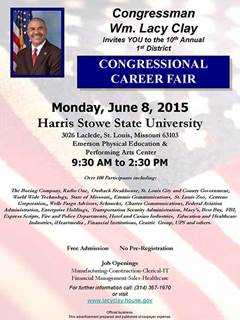JEFFERSON CITY— Passionate debates fueled lengthy sessions this week in the Missouri Senate. Senator Jamilah Nasheed, D-St. Louis, worked hard to fight against social promotions in schools this session, a seven-year fight for her, and she finally saw the progress she wanted with the passage of House Bill 42. Sen. Nasheed stated, “We will no longer socially promote the children in the Missouri education system. It is important to make sure these children are getting the quality level of education they need before they move to the next grade level.”
During the floor debate on House Bill 42, several Senators from the Kansas City side of the state voiced their concerns about the new transfer bill. Sen. Nasheed engaged them in debate to emphasize the importance of the measure for all Missouri children, not just those in Kansas City or St. Louis.
Emotions flooded the floor during the discussions that followed the Governor’s veto of Senate Bill 24. Sen. Nasheed took to the floor to give voice to the many voiceless individuals and families who would suffer from Senate Bill 24. Sen. Nasheed stated, “3,000 families and 6,000 children will suffer from this bill veto being overridden. These are the working poor! These are families that are paying taxes, but will not receive the assistance that they need.”
BILLS AND COMMITTEES
Senate Bill 270 has been reported out of conference and the conference committee report has been submitted. Senate Bill 270 is a bill that modifies various pieces of the public retirement systems. Specifically, one aspect of this bill supports the retirement of the teachers in St. Louis City and Kansas City public schools. Sen. Nasheed spoke on the importance of supporting teachers in their retirement.
ON THE FLOOR
Senate Bill 334 passed through the General Assembly on Wednesday (5-6). This was a big win for the City of Saint Louis as this bill allows Harris-Stowe State University to be on the same level as other major universities in regard to their degree-granting authority. This bill allows Harris-Stowe to offer masters degrees for the first time in the university’s history. It also expands the undergraduate degree options that are offered at this Historically Black College and University. Sen. Nasheed stated, “This is not just a win for the black citizens of Saint Louis, this is a win for all of the people of Saint Louis who are working to better themselves through education. We are trying to level the playing field for all of the people in our community who aspire for a higher education.”
Senate Bill 156, which came back from the House with additional language, passed on the Senate floor Wednesday, (5-6). Senate Bill 156 will honor the first African-American Missouri Senator – Sen. Theodore McNeal – with a stretch of highway in his name to commemorate his service to the City of Saint Louis, the State of Missouri and the African-American community. Sen. Nasheed stated, “It is important that we honor the past and acknowledge the groundwork that has been laid by the great legislators who have come before us.”
Senate Bill 166 has moved up the legislative calendar in the House and should be taken up for discussion soon. Senate Bill 166 is the “Dare to Dream” license plate bill, allowing individuals to purchase a license plates to honor Rev. Dr. Martin Luther King, Jr. and show their support for progress and equality throughout the State of Missouri and across the nation.
Senate Bill 5, co-sponsored by Sen. Nasheed, passed through the Senate on Wednesday, (5-6). Senate Bill 5 deals with the distribution of money collected by municipalities from traffic fines and court costs. The House of Representatives took the bill up for discussion on Thursday of this week and passed it out of the House to be taken to the Governor's desk.
APPROPRIATIONS
On Friday, the Governor signed House bills 1-13 which dealt with Missouri’s budget into law. “I am elated to know that the Governor signed House bills 1-13 and kept vital funding that I was able to secure for the City of St. Louis.”
The following are budget priorities that Sen. Nasheed was able to secure for the City of St. Louis:
-St. Louis Intradistrict Transportation - $200,000
-Teach for America – $3,000,000
- HB 2, Section 2.025: Provides funding to recruit, train, and develop teachers in academically struggling school districts.
-Math and Science tutoring - $300,000
- HB 2, Section 2.026: This program is administered by the Department for Elementary and Secondary Education (DESE) and goes to fund tutoring for students in grades K-12.
-Dropout Prevention - $1,000,000
- HB 8, Section 8.010: Provides funding for non-profit pilot alternative school for evidence based programs and practices for improving academic achievement of at-risk students and reducing delinquent behavior.
-Prison Re-entry Program - $750,000
- HB 9, Section 9.010: Provides funding for programs ensuring that offenders are released into the community with appropriate substance abuse treatment, mental health treatment services, housing and job training and placement services.
House Bills 17, 18 and 19 were taken up for discussion Wednesday of this week. These bills dealt with the repairs and maintenance of state universities, state parks and other state properties. All three of these bills passed out of the Senate and the House and are on the way to the governor’s desk for his signature.
OTHER NEWS
CHARTER EXPANSION, STUDENT TRANSFER BILL PASSES
 On May 5, lawmakers granted final approval to legislation intended to address the ongoing problems with Missouri’s current student transfer protocols. However, the bill barely passed in the House of Representatives, where bipartisan opponents maintained the measure primarily focused on expanding charter and virtual schools while doing little to address the transfer situation. As a result, in the event of a possible gubernatorial veto, an override is unlikely. On May 5, lawmakers granted final approval to legislation intended to address the ongoing problems with Missouri’s current student transfer protocols. However, the bill barely passed in the House of Representatives, where bipartisan opponents maintained the measure primarily focused on expanding charter and virtual schools while doing little to address the transfer situation. As a result, in the event of a possible gubernatorial veto, an override is unlikely.
Under the existing transfer law, students in unaccredited schools districts may transfer to a nearby accredited district of their choice at the expense of their home district. At present there are only two unaccredited districts in Missouri, both in north St. Louis County. Because the districts must pay tuition for their students to attend school elsewhere, one district is on the verge of bankruptcy and the other isn’t far behind. Both were financially stable before the implementation of the transfer law.
House Bill 42 would somewhat limit transfers to other districts by first requiring students to transfer to an accredited school within their home district, if possible. If no openings are available at an accredited school in-district, then they would be allowed to go elsewhere. However, tuition would remain uncapped under the bill.
The measure also would allow for the expansion of charter and virtual schools to all school districts in St. Louis County and all but three small districts in Jackson County. At present, charter schools, which are taxpayer funded but operate free of many state requirements are authorized only in St. Louis city and Kansas City.
The House approved the bill 84-73, with just two more votes than required for passage but 25 short of the 109-vote supermajority needed in the event of a veto override. The Senate endorsed the bill 23-11. The governor vetoed similar legislation last year.
LAWMAKERS SEND MUNICIPAL COURT REFORM TO NIXON
On May 7, the House of Representatives voted 134-25 to send the governor legislation that would further restrict how much revenue local governments may derive from traffic fines and court fees and impose various reforms on municipal court operations. The Senate approved the bill 31-3 a day earlier.
Existing law caps revenue from traffic fines and fees at 30 percent of a city’s operating budget. Senate Bill 5 would lower the cap to 20 percent for most Missouri cities and 12.5 percent for municipalities in St. Louis County, where accusations of police and courts being used primarily to generate revenue have been most common. Critics of imposing more strict requirements on St. Louis County cities say such practices occur statewide.
In addition, the bill would limit combined fines and court costs for minor traffic violations to $300 per offense. Other provisions would prohibit courts from jailing defendants for minor violations or inability to pay fines and bar courts from issuing separate charges for failure to appear in court, although arrest warrants could still be issued to compel court attendance.
The bill also would require St. Louis County municipalities – but not other Missouri cities – to adhere to certain minimum operational standards or potentially face serious consequences, including administrative takeover or disincorporation. The attorney general would have the duty of bringing suit to enforce those standards.
GOP OVERRIDES VETO OF BILL CUTTING BENEFITS FOR KIDS
On May 5 the Republican-controlled General Assembly overrode Democratic Gov. Jay Nixon’s veto of legislation that will strip more than 6,300 Missouri children of their welfare benefits when it takes effect Jan. 1. The override came on votes of 25-9 in the Senate on May 4 and 111-36 in the House of Representatives the next day.
Senate Bill 24 lowers the lifetime cap on benefits under the Temporary Assistance for Needy Families (TANF) program from 60 months to 45 months, a 25 percent reduction. Nearly 9,500 current recipients – two-thirds of whom are children – will lose their benefits as of Jan. 1 because they will have already exceeded the new 45-month limit.
Republican supporters of SB 24 say reducing TANF benefits will encourage recipients to take more personal responsibility for their situations. Democratic opponents question how children, as the bulk of TANF beneficiaries, are supposed to take personal responsibility for their parents being poor.
Senate Bill 24 marks the second time this year lawmakers have overridden the governor’s veto. The first came last month on an elections bill that, among other provisions, prohibits retired school superintendents from being elected to the school board of their former district. The Republican-controlled legislature has overridden Nixon on 24 vetoed bills and 48 line-item budget vetoes since he took office in 2009.
NIXON REJECTS CUTS TO UNEMPLOYMENT COMPENSATION
Gov. Jay Nixon on May 5 vetoed legislation that sought to slash the maximum weeks of unemployment benefits by more than a third. A veto override attempt isn’t expected, however, since the vote granting the bill final approval in the House of Representatives fell well short of the two-thirds supermajority necessary to overrule the governor.
“Unemployment benefits not only provide a safety net for workers, they also provide an important boost when the economy is struggling, as those workers buy food, clothing and other essentials,” Nixon said in his veto message. “The unemployment system has proven to be vital to economic stability and recovery. The changes sought by HB 150 are unnecessary and unfair, and accordingly this bill fails to receive my approval.”
 Under existing law, unemployed Missourians can receive a maximum of 20 weeks of benefits, which is fifth lowest in the nation. Missouri is one of just eight states that provides fewer than 26 weeks of benefits. Under existing law, unemployed Missourians can receive a maximum of 20 weeks of benefits, which is fifth lowest in the nation. Missouri is one of just eight states that provides fewer than 26 weeks of benefits.
House Bill 150 sought to base the maximum weeks of benefits on the statewide unemployment rate during the previous year, with maximum benefits ranging from just 13 weeks if the statewide rate is below 6 percent to 20 weeks if the statewide rate is 9 percent or higher. The bill wouldn’t have accounted for regional differences in the unemployment rate, meaning workers in economically struggling areas would still receive the reduced level of benefits if the state’s overall unemployment rate remained low.
The House passed the bill on a vote of 88-68, falling 21 votes short of the 109 needed for an override. Twenty-six Republicans joined unanimous Democrats in opposition. The Senate passed HB 150 on a straight party-line vote of 21-8. Support was just two votes short of the 23 necessary to override, but four Republican senators were absent.
Nixon also vetoed similar legislation last year. Although the Senate voted to override, the effort failed in the House.
NIXON RELEASES $67 MILLION IN FY 15 SPENDING AUTHORITY
State revenue growth continued in April, prompting Gov. Jay Nixon to release another $67 million in spending authority he had restricted in order to keep the fiscal year 2015 state budget in balance. However, roughly $269 million in spending restrictions remain.
The bulk of the restored spending authority is education related. Those items include $16 million for various capital projects at public universities, $15 million for college scholarships and $10 million for local school districts’ transportation costs.
Through the first 10 months of Fiscal Year (FY) 2015, net state general revenue collections increased 7.7 percent compared to the same period in FY 2014, going from $6.7 billion to $7.22 billion. Net general revenue collections for April 2015 jumped 11.9 percent compared to those for April 2014, going from $1.13 billion to $1.26 billion.
The Missouri Health Department released a report on Wednesday about Obesity in the City of Saint Louis. One of the main points of the report highlighted that 61 percent of the residents over the age of 16 are overweight or obese. The full report discloses more shocking information about the obesity rate in the City of St. Louis. The report details some of the demographic information found in the study: males, and older residents are more likely to have weight problems.
The St. Louis Agency on Training and Employment (SLATE) announced this week that it will be restarting its popular Micro Enterprise Competition. The competition is designed to support entrepreneurs in the St. Louis area with training and support. The winning proposal will receive $1,000 to be used for business needs like advertising, equipment, and general growth. Interest participants can e-mail their resume by Monday, May 11 to specialprojects@stlworks.com, and register with SLATE at www.jobs.mo.gov. |



